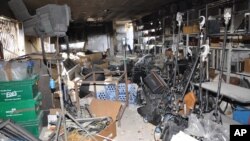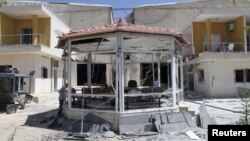Wednesday's developments came as United Nations investigators accused President Bashar al-Assad's forces of committing rights violations on "an alarming scale."
The pre-dawn attack on the al-Ikbariya satellite channel near Damascus killed three journalists and four security guards. The station - which resumed broadcasting shortly after the raid - is privately-owned but strongly supports Mr. Assad's government.
Information Minister Omran al-Zohbi said the explosives that destroyed a number of the broadcaster's studios had been planted by "armed terrorists" - the term the government uses for rebels. Anti-government fighters denied carrying out the attack. They said a unit of the elite Syrian Republican Guard assigned to guard the station had defected and attacked other government soldiers.
Activists say more than 14,000 people have been killed since the revolt against Mr. Assad's government broke out in March of last year and that the death toll has increased sharply during the past few weeks.
Annan, the joint U.N.-Arab League envoy for Syria, said Saturday's "action group" meeting would attempt to agree on principles for a "Syrian-led political transition." He said the five permanent members of the U.N. Security Council had been invited as well as representatives of the Arab League and Turkey.
Major regional players such as Iran - an important Syrian ally - and Saudi Arabia were conspicuously omitted. The United States has strongly objected to Tehran's participation, asserting it has facilitated Mr. Assad's brutal repression during the nearly 16-month-old conflict.
U.S. Secretary of State Hillary Clinton and Russian Foreign Minister Sergei Lavrov have said they would attend.
Meanwhile, a United Nations panel investigating human rights violations in Syria said the situation is "dangerously and quickly deteriorating" and that fighting has "escalated dramatically" since an April cease-fire deal.
The investigators said they were unable to conclusively determine who was responsible for a May 25 attack on the central town of Houla, which killed 108 people, but it considers the possibility that pro-government forces "may have been responsible for many of the deaths."
The panel's Brazilian chairman, Paulo Pinheiro, said "gross human rights violations" - including torture and summary executions - are regularly committed by both sides.
The commission highlighted the plight of children caught in the conflict and the use of sexual violence against men, women and children, particularly by pro-government forces. Pinheiro said his team is especially concerned about reports of the opposition using children as medical porters and messengers, and exposing them to the risk of death and injury.
In a 20-page report, U.N. investigators warned that the killings are increasingly driven by sectarian, not political, motives.
Syria's ambassador to the United Nations in Geneva, Faisal Khabbaz Hamoui, dismissed the accusations against the government and warned Damascus would end its cooperation with international agencies. He then walked out of the council chamber.
Some information for this report was provided by AP, AFP and Reuters.






